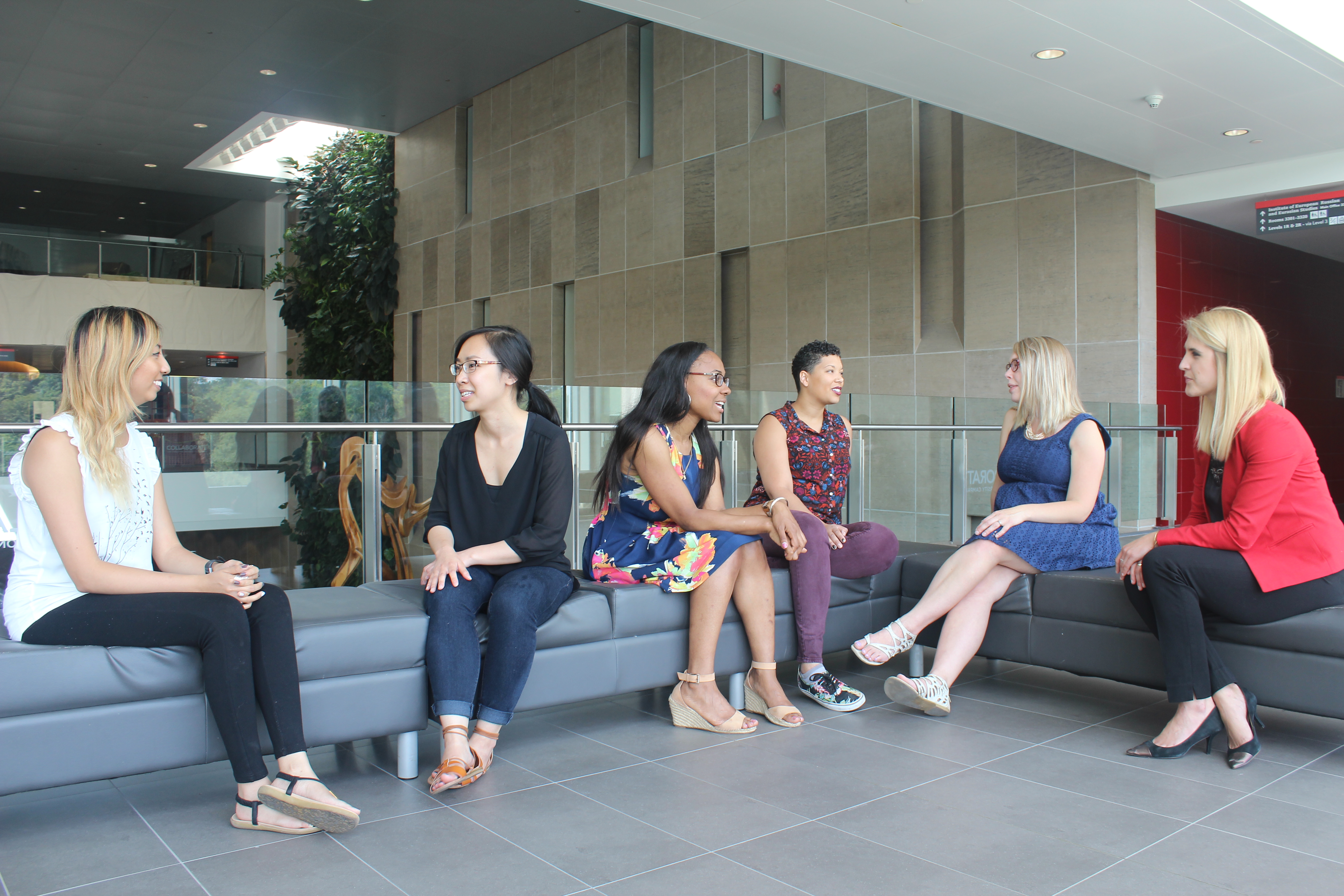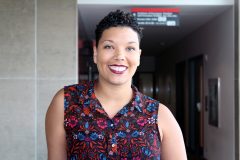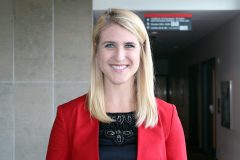Inaugural Cohort Finds Success in the Workplace
Carleton’s Food Science and Nutrition Program can take graduates in many career directions within the food industry, if the inaugural class of 2012 is any indication.
The four-year undergraduate program starts with foundational courses in chemistry and biology, followed by core courses in food sciences. Food science courses deal with current issues and focus heavily on food safety, risk assessment, and the regulation of the food industry. To ensure graduates are well-rounded scientists, courses in communications, economics, and marketing are also included.
Most of the class’s graduates now work as quality assurance professionals in the food industry, or are involved in food regulation. One has leveraged her interest in the construction of processing facilities into a career in project management. Another shares her passion for math and science as an elementary school teacher.

No matter where their studies have led them, they agree that the Food Science and Nutrition Program gave them vital knowledge and experience.
“Analytical and laboratory skills developed in Food Chemistry and Food Microbiology labs are used every day in the testing laboratory,” says Kristine, a quality assurance technician with Costco Wholesale Canada.
Many grads note that the program involves much more than classroom learning. “I am a very hands-on person, and the labs allowed me to practise the methods that we talked about in class,” says Leanne, a quality control technician with Parmalat Canada.
Given Carleton’s location in Canada’s capital, students benefit from presentations by guest speakers from government departments. They also get a look at the city’s private sector work environment—sometimes through co-op programs and sometimes courtesy of program graduates.
“One of my favourite activities is giving tours of our manufacturing facility to current students,” says Anna, a quality supervisor at Healthcare Food Services, whichmakes food for health care facilities. “When I was a student, it was hard to imagine what a food manufacturing environment even looked like, so I am pleased that I can now give students the opportunity to learn through experience.“
This sort of ongoing relationship with Carleton is not unusual among graduates. Since classes are small—each year, roughly 25 people enter the program—students develop close and lasting relationships with each other and their professors.
Graduate Megan, now a policy and programs specialist with the Canadian Food Inspection Agency, mentions instructor Véronic Bézaire. “Throughout my time at Carleton, Véronic was my mentor and always made time to provide me with guidance and advice. To this day, I consider her my mentor and friend.”
–Laura Byrne Paquet
Insight from the inaugural graduating class

-
Why did you choose to study Food Science and Nutrition at Carleton?
I chose the Food Science and Nutrition program at Carleton University because food was always a major discussion in my home – from diet and nutrition to food manufacturing to farming. When I learned that there was a Food Science and Nutrition program at the University of my choice, it was the perfect opportunity for me!What was your career path after graduation?
After I graduated in May 2012, I started the dreaded job search. Thankfully, because of some good timing I quickly landed a job the following September at Healthcare Food Services (HFS) as a HACCP Support. HFS is a food manufacturing facility that makes food for hospitals, retirement homes and other healthcare facilities. HFS is unique in that we produce many different types of products (close to 300!), so there is a lot to learn.This role was mostly administrative, and I helped the HACCP team with extra duties while I learned more about working in a food manufacturing facility. In 2013, I was given the opportunity to work on-floor in Quality Control. In this role I worked on the production floor, verifying critical control points and releasing products, performing organoleptic assessments, troubleshooting quality and food safety issues and learning about the manufacturing processes of all the products made at HFS.In early 2015 I was given my first leadership opportunity as a Quality Coordinator. HFS wanted to become GFSI- certified and they asked me to lead the project. After a lot of hard work, we successfully were SQF certified, and as a result, I was promoted to Quality Supervisor. I now maintain and continuously improve our SQF system.What skills did you develop in your degree? How do these skills apply to your current employment?
The Food Science and Nutrition program is very broad and touches upon a variety of topics. This gave me a good base to understand the rationale behind many of the regulations that we abide by in Canada. This makes it easier for me to communicate with regulatory and certification bodies. The countless structured lab reports that we had to write in the Food Science and Nutrition program taught me the discipline required for the procedure and report writing that I do now.What is your fondest memory from your time at Carleton University?
My Poster Day in 4th year will always be a very special memory to me. At the time, I was working two jobs, doing my honours project, and attending my courses. Despite the seemingly impossible amount of work, I was able to finish it all, and on Poster Day I was proud to show the world my accomplishments.What are the benefits of studying Food Science and Nutrition in the nation’s capital?
Ottawa is a government town, which means that it is full of opportunities to learn about food and nutrition issues from the lesser-known regulatory standpoint. One of our courses was taught by a former President of the CFIA, and he provided us with real life stories and anecdotes that gave us insight into what the food industry in Canada is really like.

-
Why did you choose to study Food Science and Nutrition at Carleton?
The short answer is my love for food. I had always wanted to know more, cooking at home was always something I had done since I was young, but there was always something more interesting about food that I wanted to learn. I also have always had a very strong science background and wanted something more than the basics. Food science just seemed to fit, getting everything from food to chemistry, to biology.What skills did you develop in your degree? How do these skills apply to your current employment?
The food science program has a hands-on feel. We got a lot of opportunity to use various equipment in the lab and to do a wide range of experiments. In my current job I help manage new methods that come into the lab. My experience at Carleton really helped me in applying techniques and evaluating how they can be used on different products.What professor, project or course did you enjoy the most?
Some of my favorite courses involved labs. I am a very hands-on person and the labs allowed me to practice the methods that we talked about in class. One of my favorite classes was Food Analysis because it introduced analytical methods that we had not seen previously. I also really enjoyed the Regulation of the Food Industry class because it taught us about both how government regulation and the industry have to work together in order for food to be distributed in a safe manner.What advice do you have for prospective students thinking about studying Food Science and Nutrition at Carleton?
Take every opportunity that you can as you never know which stepping stone will lead you to your dream career.

-
What is your current job?
My official title is Quality Assurance Technician at Costco Wholesale Canada; although, I perform functions outside of that title. I routinely test our private label brand items (Kirkland Signature) against parameters specific to the product. I test a variety of products with varying intrinsic properties such as rice, honey, coffee, sliced deli meats, bacon, and cheeses. I help support our environmental monitoring and food court ice cream testing in our warehouses across Canada. Some administrative duties include requesting third party lab testing services, shipping/receiving of samples, and lab supply ordering.Outside of my main role, I provide occasional support to our vendor audit group to review third party audits of our vendors. I act as a recall coordinator for both foods and non-foods recalls which encompasses communications with our vendors, buying groups, and to our members.What skills did you develop in your degree? How do these skills apply to your current employment?
Analytical and laboratory skills developed in Food Chemistry and Food Microbiology labs are used every day in the testing laboratory. Understanding each food’s unique matrix allows me to choose the appropriate test methods for each item that I test. I often work with outside labs to ensure uniform test methodology in Canada and the US. Without prior food specific knowledge, the learning curve to understand specific tests that are unique to certain food matrices would be difficult.Knowledge of industry and the government’s role in food safety recalls from the Regulation of the Food Industry course gave me an advantage when conducting recalls. Since I already knew the basic steps involved in a recall from both the government and the industry side, I could easily jump in and assist in any ongoing or expanded recall. The Food Quality Control course was also essential to reviewing our vendor’s food safety audits. I had a strong background in understanding the auditing processes as well as prioritizing non-conformances that require immediate corrective action.What is your fondest memory from your time at Carleton University?
Poster day was an exciting day. It is a great way to showcase our Honours research project in an informal setting and see other science students’ research projects.What professor, project or course did you enjoy the most?
Rather than one course in particular, I most enjoyed having guest speakers from industry and government. Each speaker brought a unique experience and perspective to share. Not only did they put into perspective the importance of what we were learning, but also gave us real world applications and an idea of what we could do after graduation.

-
What was your career path after graduation?
After I graduated in the Food Science and Nutrition program I worked as a Quality Assurance intern at HealthCare Food Services, a federally registered meat plant. Afterwards I moved to start a Master’s degree in Food Safety and Quality Assurance. I was 7 months into my Masters when I applied and accepted a job offer from the Canadian Food Inspection Agency. I worked as a Food Safety inspector for 3.5 years with the opportunity to act as the Food Safety Supervisor for a few weeks. After 3.5 years, I moved to the Programs and Policy Branch in the Food Import Export Division.What skills did you develop in your degree? How do these skills apply to your current employment?
Some of the skills I learned in the program include presentation and writing skills. In this program we had the opportunity to do numerous presentations which really helped develop these skills. Writing skills were also developed as we had to write various laboratory reports and a thesis during our fourth year. All of these skills are important in the workplace.What is your fondest memory from your time at Carleton University?
My fondest memory from Carleton University is the friendships that I made in the Food Science program. To this day I am still good friends with my former classmates.What professor, project or course did you enjoy the most?
The course I enjoyed the most was the Food Quality Control course. After taking this course, I knew I wanted my career to be focused on Food Safety/Quality Assurance rather than a laboratory or research type job.What are the benefits of studying Food Science and Nutrition in the nation’s capital?
Being in the nation’s capital, I had the great benefit of conducting my fourth year research project at a Health Canada lab. It was a great experience and networking opportunity.

-
Why did you choose to study Food Science and Nutrition at Carleton?
I wanted to pursue a career in science as well as regulation. The Food Science and Nutrition program drew my interest due to the diverse range of courses ranging from science (biology, chemistry, biochemistry etc.), food science (food chemistry, food microbiology, food engineering, food packaging, etc.) and regulation (food quality control, regulation of the food industry).What skills did you develop in your degree? How do these skills apply to your current employment?
The Food Science and Nutrition program is diverse. I gained hands-on experience in the laboratory as well as knowledge and analytical skills from the different courses taken. These skills allowed me to be able to assess risk, rationalize, manage and formulate policies/procedures in the workplace.What is your fondest memory from your time at Carleton University?
My fondest memory from my time at Carleton University is the friendships I made with classmates especially with those in the Food Science and Nutrition program.What advice do you have for prospective students thinking about studying Food Science and Nutrition at Carleton?
Meet with the Food Science and Nutrition Program faculty to get a better understanding of the program. Ask about research opportunities in laboratory to get hands-on experience.

-
What is your current job?
I currently work within the Project Management Organization (PMO) at BWXT-NEC managing a range of projects from engineering design to supply. Albeit the learning curve is steep and I having strayed from the field of food science, my career continues to bring me immense gratification as it allows me to continue to apply the key scientific skills, but simply in a different field of study.What skills did you develop in your degree? How do these skills apply to your current employment?
I feel as though my degree taught me how to think critically, and provided me with tools and techniques on how to approach and solve problems or obstacles in a systematic and logical way. It also trained me to develop a certain work ethic, as doing so was necessary in order to stay on track with the program’s curriculum. As a Project Manager, I am confronted with issues every day, be it cost, schedule, or quality risks, to name a few. All of these issues need to be assessed, quantified regarding their impact and consequence, and an action to manage the issue must be established and implemented effectively in collaboration with a Team. This sequence of events is scientific and systematic in nature and is the type of transferrable thought process that was taught in the Food Science program.What is your fondest memory from your time at Carleton University?
Although I adored the ‘heavy’ science courses, I found the fourth year classes on Regulation of the Food Industry and Risk Assessment, Management, and Communication very interesting. I found that these regulatory classes were ‘the cherry on top’ in terms of summing up the 4 years of teachings; they were the last piece of the puzzle!What are the benefits of studying Food Science and Nutrition in the nation’s capital?
Carleton truly felt like home to me. In addition to the scenic campus, and warm and friendly staff, the university had a tremendous amount to offer such as the hands-on academic and employment opportunities, which (in my experience) cannot usually be said with regard to universities. I am always thankful for my opportunity to have worked in the Food Science Lab at Carleton under the direction and supervision of Dr. Tyler Avis for both summer employment and my undergraduate thesis. What a fantastic experience! These offerings through Carleton were significant factors in my ability to obtain employment so soon after graduation.What advice do you have for prospective students thinking about studying Food Science and Nutrition at Carleton?
Reach out to your professors – they are wonderful individuals who are there to support you and are happy to guide you along the way. Also, get involved – seek opportunities to work with your professors and peers in the Food Science Lab to gain practical hands-on experience working in the world of research and development. It was the best thing I ever did! Best of luck to all of you!

-
Why did you choose to study Food Science and Nutrition at Carleton?
Before entering the Food Science and Nutrition Program at Carleton, I obtained a BSc in Biology and worked as a laboratory technician in Water Quality Control for the City of Ottawa for one summer. I developed a fascination for Food Science since I had the chance to meet a real life Food Scientist through my Mycology course in my Third Year of Undergraduate degree in Biology. I took a risk and went back to school for a BSc in Food Science and Nutrition.What was your career path after graduation?
Food Science & Nutrition paved the way to the field of education. I worked for The Canada Science and Technology Museum in their education division. I also worked for the Pinecrest-Queensway Community Health Centre as a tutor with youth at risks.What is your fondest memory from your time at Carleton University?
The atmosphere, it is such a positive learning environment. The professors are very supportive. I will never forget my first year Chemistry Teacher Robert Burk who taught his students about perseverance and resilience. He really knows how to make new students feel confident in their abilities.What professor, project or course did you enjoy the most?
I really enjoyed my course in Food Microbiology. I also worked for two summers with Dr. Avis and our work was published in a Food Science Journal.